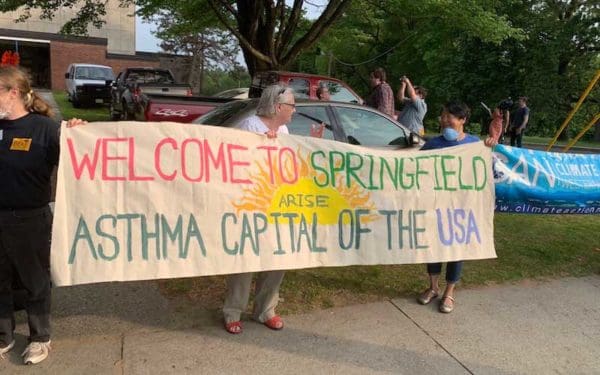Jul 10, 2019
Springfield, alongside community and environmental organizations like CLF, has been fighting this proposed biomass plant for years. We set the fight aside in 2017 when Palmer Renewable Energy, the company behind the proposal, paused its plans for construction. But now the company is back, hoping that its efforts to weaken state policy will bring its proposal back to life.
Jul 09, 2019
“Communities across Boston are choked with air pollution,” said Alyssa Rayman-Read, Vice President and Director of CLF Massachusetts. “Tailpipe exhaust is poisoning disadvantaged areas that already suffer from diseases like asthma at much higher rates. We must do better for our kids, and that starts with holding Transdev responsible for illegally spewing toxic pollution into our neighborhoods.”
Jul 03, 2019
This month’s MBTA fare hikes came on the heels of two trains derailments. But it’s not only headline-making derailments and delays that are a problem. The T must also improve daily bus service and make progress on long-awaited projects to ensure fair and equitable service to all of its riders.
Jun 28, 2019
“It’s simply insensitive and unfair to ask riders to pay more while the Red Line struggles to get people to and from their jobs,” said Staci Rubin, Senior Attorney at CLF. “The T clearly needs more funding and staffing, and some of those funds should come from predictable fare increases that do not disproportionately impact transit-dependent riders. However, this round of hikes should absolutely have been postponed at least through the summer.”
Jun 27, 2019
Stand up for the Atlantic’s only marine monument: the Northeast Canyons and Seamounts.
Jun 27, 2019
“The loss of [six] more whales, and at least two breeding females, is catastrophic,” said Erica Fuller, a senior staff attorney at the Conservation Law Foundation, which has sued the National Oceanic and Atmospheric Administration to force it to take more aggressive action to protect right whales. “Both countries need to treat this like the emergency that it is.”
Jun 25, 2019
“It shouldn’t take two derailments in the span of a week to finally give the T some desperately-needed new funding and staffing,” said Staci Rubin, Senior Attorney at CLF. “The MBTA has been in a state of crisis for years, and this immediate infusion of cash will speed up improvements and should benefit train and bus riders across the board. Thousands of people rely on the T every day and it’s time riders have a safe trip they can depend on.”
Jun 24, 2019
“Ending this rebate while the program is gaining such momentum is a huge lost opportunity,” said Amy Laura Cahn, Director of CLF’s Healthy Communities and Environmental Justice program and a member of the Massachusetts Zero Emission Vehicle Commission. “Gas-burning cars accelerate our climate crisis and pollute our neighborhoods, and the rebate program helps families make the switch to clean electric vehicles. Eliminating the program without providing alternatives takes away needed resources and threatens to set us back in reaching our climate goals.”
Jun 21, 2019
This weekend’s mile swim in Massachusetts’s Charles River has been cancelled because of dangerously high bacteria levels in the water. We’re working to make sure the river is clean and swimmable for the long-term.
Jun 20, 2019
When Dr. Megan Sandel talks about the connections between health and housing, one patient, in particular, stands out. “I was treating a cute two-year-old who hadn’t outgrown his 12-month clothes,” she says. “I ordered expensive tests and nutritional supplements that had no impact week after week.” Then, all of a sudden, the child started growing. She came… Continue reading Community Investing for Health, Not Just Profit








